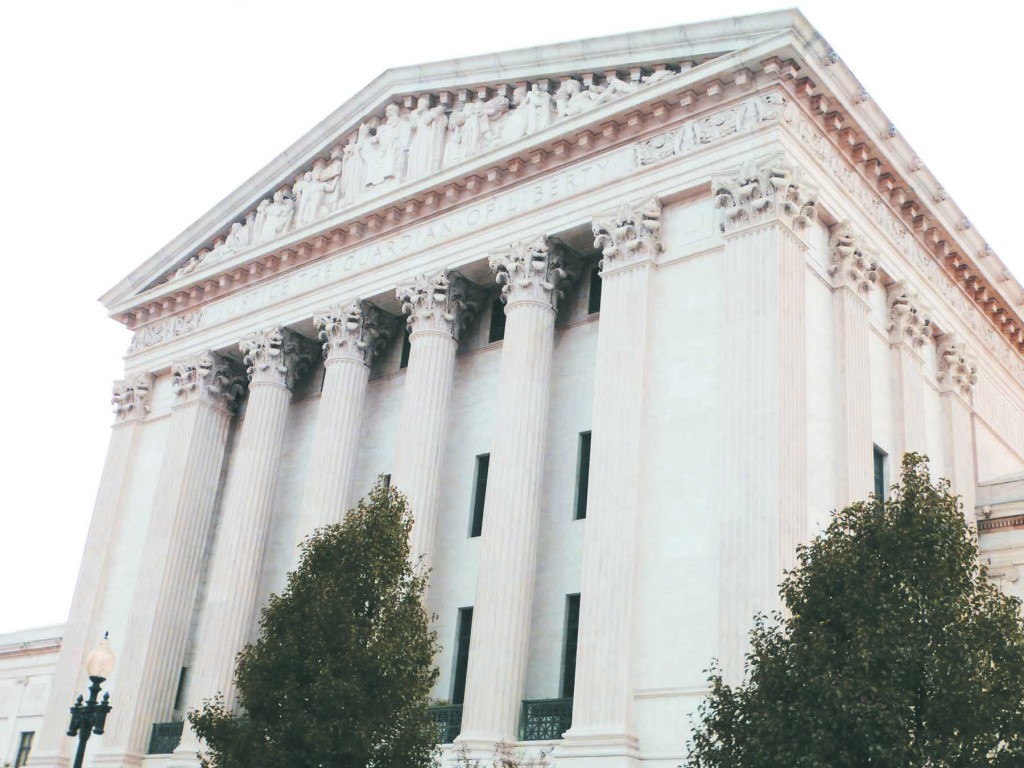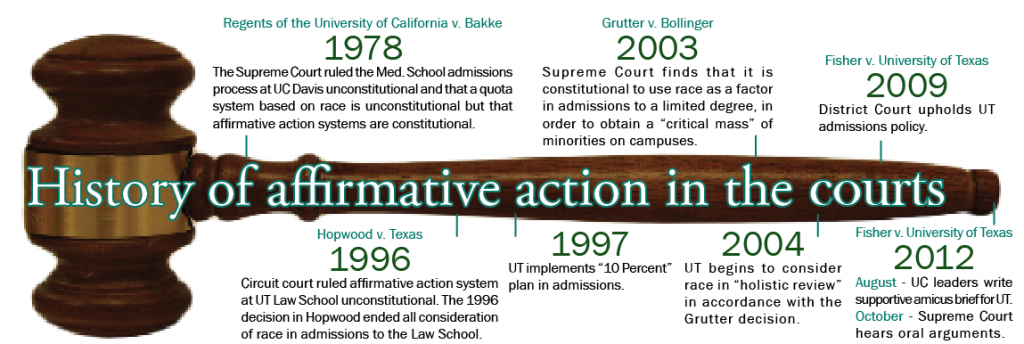
Since second grade, Texan Abigail Fisher’s dream school was the University of Texas. At her suburban high school, she earned a grade point average of 3.59 and a spot in the top 12 percent of her class. She was a cellist, co-captain of the orchestra, participated in math competitions, and volunteered for Habitat for Humanity, according to CNN.
Now at age 22, after Fisher’s graduation from Louisiana State University, her lawsuit against UT is being considered in the U.S. Supreme Court. The case challenges her rejection, alleging that she was not admitted because she is white.
Richard Sander, professor of law at University of California, Los Angeles, said UT admissions automatically admits any Texan applicant who ranks in the top 10 percent of his or her class. Other applicants are considered in a separate admissions pool, in which their applications are reviewed holistically based on a variety of criteria, one of which is race.
Melissa Hart, associate professor and director of the Byron R. White Center for the Study of American Constitutional Law at the University of Colorado Law School in Boulder, said affirmative action is a practice used by universities and employers. Its goal is to maximize equal opportunity for underrepresented minorities who are the victims of a disparity in opportunities earlier in life or in education and to increase diversity.
In terms of affirmative action in college admissions, Carl Cohen, professor of philosophy at University of Michigan, believes the term “race preference” is more appropriate language in the context of race as a factor in college admissions, and defined it as “preference for certain minority groups in admissions.”
“The original rationale [for race preference in college admissions] is that there would be a compensatory device because of oppression minorities have suffered in years past, but that has been found unacceptable by the courts,” said Cohen. “So now universities don’t use that justification. They use what courts do find acceptable—diversity in incoming classes.”
Sander said that in the 1978 case Regents of University of California v. Bakke, the Supreme Court ruled to outlaw strict racial quotas.
Kevin Brown, Richard S. Melvin professor at Indiana University Maurer School of Law, said the 2003 Grutter v. Bollinger case upheld that it is constitutional to give race substantial weight as a factor in the admissions process, in order to obtain a “critical mass” of minorities on campuses. Brown added that this applies only to minorities who both have a history of discrimination and are underrepresented in colleges, so affirmative action does not apply to Jews and Asian-Americans due to their “over-representation” on campuses.
Brown said that while some believe that “critical mass” is when representation of minorities in college mirrors representation in state population, it must remain a “flexible concept,” particularly with the Court’s prohibition of numerical quotas.
Sander said in the current Supreme Court case, Fisher’s lawyers are arguing that UT is violating the criteria laid out in Grutter, and as a result the Supreme Court is likely to either reverse Grutter or make it much more “concrete” with the upcoming decision.
Sander and Cohen predict the Court will rule in favor of Fisher.
Brown said he expects the swing vote in the decision, Justice Anthony Kennedy, to be in favor of further limitation of racial consideration in college admissions, because in his Grutter opinion Kennedy rejected the notion that there should be no limit on the weight given to race in admissions.
“[I] expect affirmative action [to] survive, but colleges and universities will be told to put less weight on ethnicity,” said Brown. “The impact that has is a reduction in the amount of blacks and Latinos going to our selective higher education institutions.”
Hart said if Grutter is overturned, schools will probably seek other ways to accomplish diversity in their classrooms. She feels that diversity is a crucial part of an educational environment to teach students to “operate effectively in a diverse environment.”
Although Sander said classroom diversity is important, he has seen racial preferences in college lead to what he has termed “mismatch,” in which students who are admitted because of racial preferences are not academically fit to succeed in their school. Sander said in order to combat “mismatch,” transparency in admissions is one of the most necessary affirmative action reforms, and that schools should tell admittees who have been given preference their chances of success with certain degrees.
Cohen does not support race preferences, as he feels it is morally wrong to treat people differently because of race and illegal under the Constitution’s equal protection clause.
“Giving preference by race is unwholesome activity,” said Cohen. “It creates doubt and resentment and sometimes even hostility between races. It does not advance the cause of racial understanding, but sets it back. It’s only when we cease to treat the races differently that we can create a racially healthy environment. The way to stop racial discrimination is to stop discriminating by race.”
Senior Derek Franklin said that in Glenbrook North’s competitive learning environment, affirmative action in admissions can be frustrating.
“I understand the colleges’ point that a diverse student community can create a higher quality education,” said Franklin. “But it’s also a little bit frustrating when you’re applying to college and know that universities may be using the color of your skin or where you come from as grounds to decide whether you can get in.”
Brown, however, said that arguments against affirmative action fail to recognize the impact of race in American society, which he said is indicated by marked differences in family income and performance on standardized tests based on race and ethnicity.
“For a person like Abigail Fisher to say ‘had I been black, I would’ve gotten in’ denies the importance of race, because if she were black…she would’ve had different heroes, she would’ve had different stories told to her when she was growing up, she would’ve lived in different neighborhoods, she would’ve had different friends,” said Brown. “Her entire life would’ve been different. So to act as if race-neutral admission does not discriminate against the minorities in our society is to ignore the reality that race in American society still matters and it matters a great deal. The only people who might think race doesn’t matter tend to be whites in America.”
Senior Robert Krebs said he thinks students should understand how fortunate they are for their opportunities in Northbrook.
“For those with less opportunities, affirmative action allows them to be the first person to go to college or break the cycle of poverty,” said Krebs. “Many GBN students, on the other hand, see this as a discouraging factor.”
While Hart acknowledges this sense of frustration, she said that between preferencing legacies, certain majors and athletes, “there are so many other kinds of unfair advantages that people aren’t considering.”
Hart believes colleges should look at a person with a “holistic” view, maintaining that one’s race is part of one’s identity.
Sander said he thinks “race is increasingly hard to define” and increasingly a less accurate way to “capture disadvantage.” Sander said colleges should look towards socioeconomic preference as an alternative that “reduces the perception that everyone of a particular color is being treated by a different standard.”
The Supreme Court heard oral arguments for the Fisher v. UT case on Oct. 10. According to Sander and Cohen, the case is expected to be decided by June.


